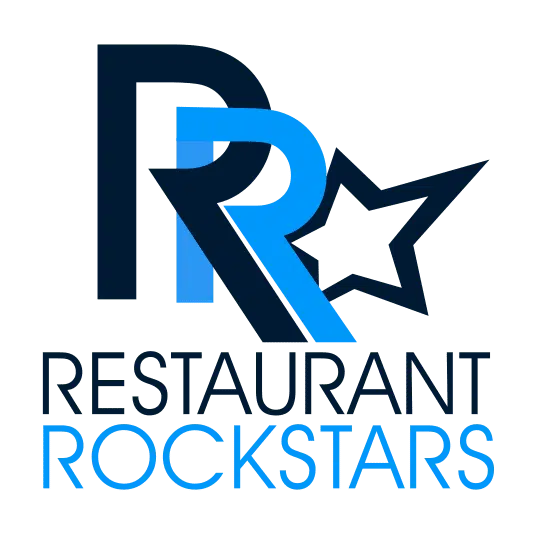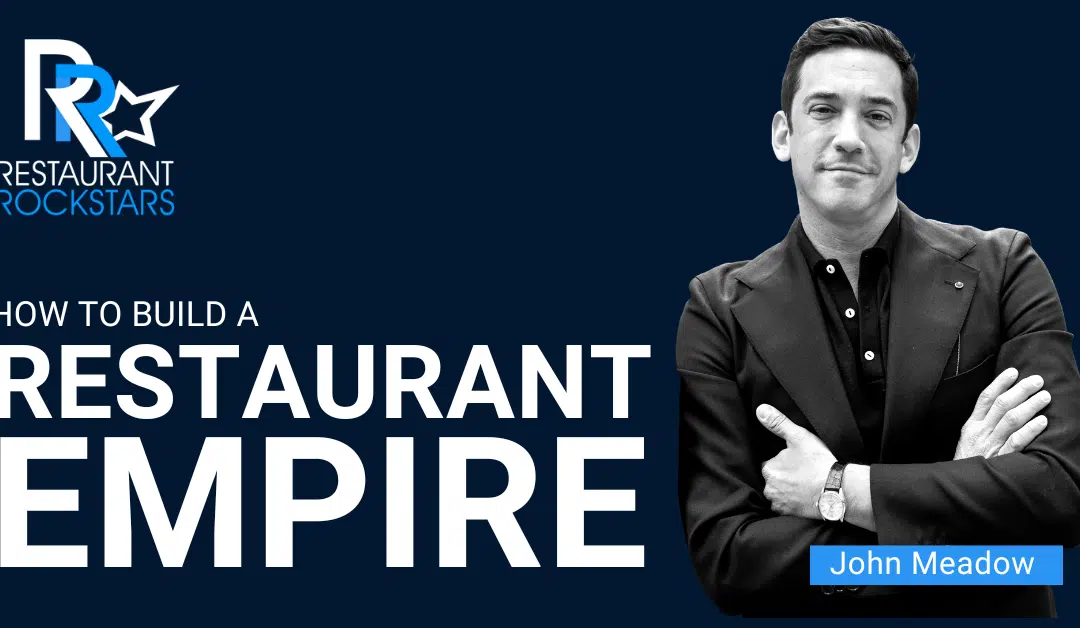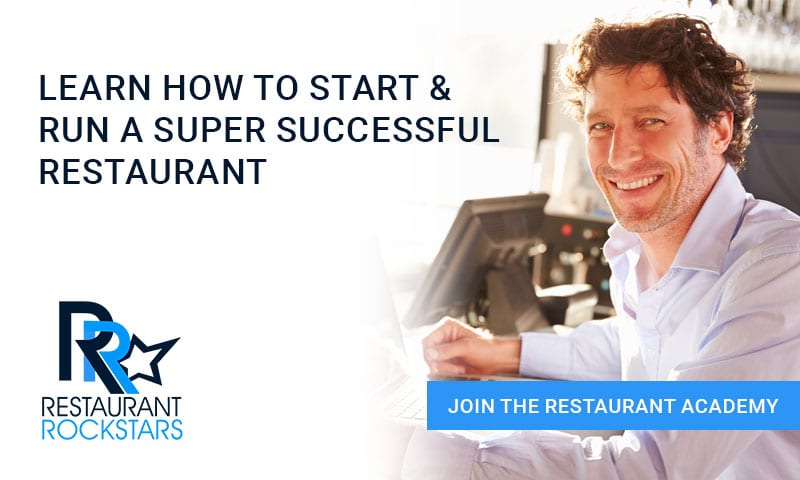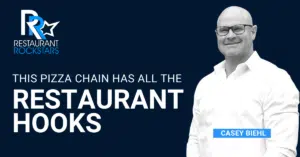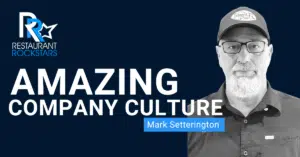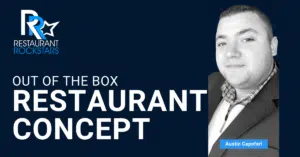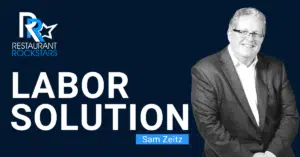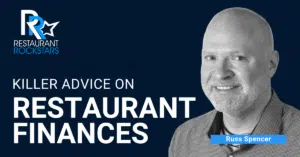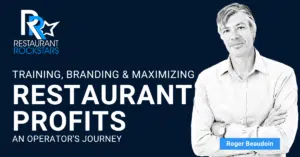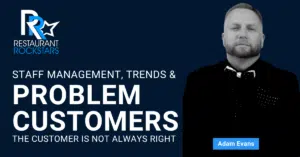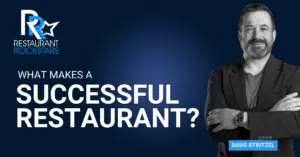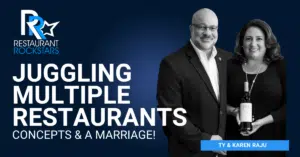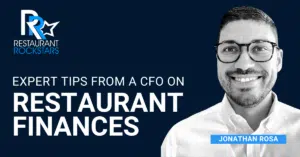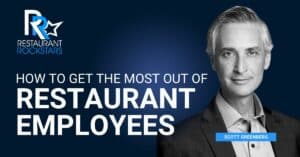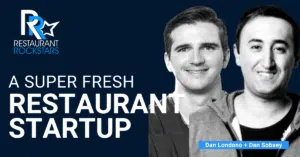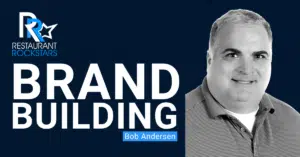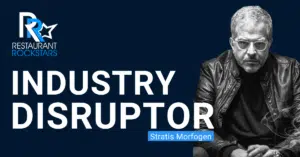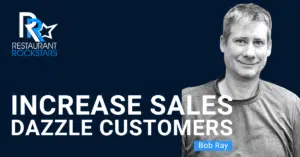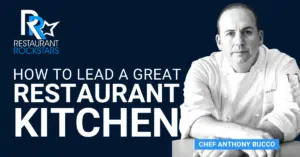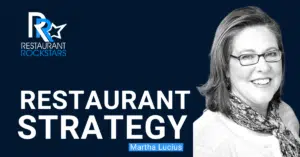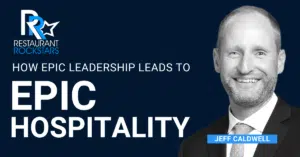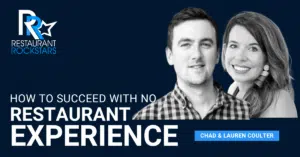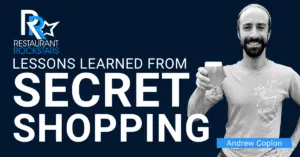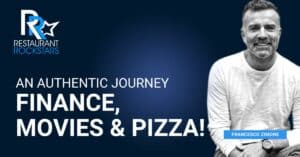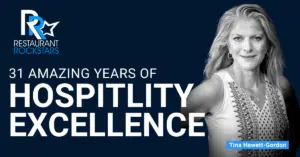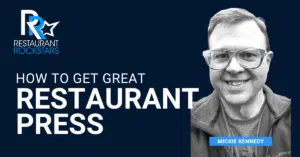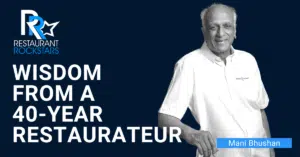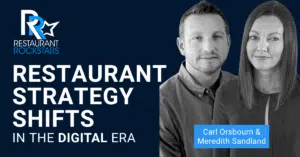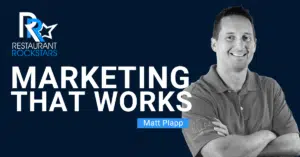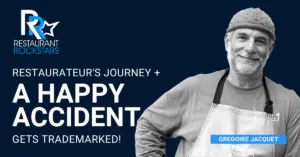Restaurant Rockstars Episode 324
Building a Restaurant Empire
LISTEN HERE OR ON YOUR FAVORITE PODCAST PLAYER
Prefer to watch the interview?
Click the video below.
Whether you have a single restaurant or multiple restaurant concepts in the great cities around the world, we all share a vision and a passion for hospitality.
Pleasing guests and running a great business are of course the driving forces behind everything we do each and every day.
In this episode of the Restaurant Rockstars Podcast, I’m speaking with John Meadow, Founder and President of LDV Hospitality who is truly building a global restaurant empire one concept at a time.
Listen as John tells us:
- The challenges of starting his first restaurant and then growing a restaurant empire of multiple concepts in many cities
- Experiments, fails, big victories and key-learnings
- A typical day leading his company forward
- Leadership style vs. management
- Necessary systems, technology, and financial controls
- The labor crisis, training philosophies and building team loyalty
- How to maintain overall consistency across many restaurants
And much more….
In Italian, La Dolce Vita translates to the “Good Life” and thus the namesake of LDV Hospitality. John and his team are delivering the good life to guests and staff alike and we can all be inspired by their company culture.
Watch or Listen to this episode and then go out there and Rock YOUR Restaurant!
Roger
Connect with our guest:
0:00
and promoting from within. It’s a simple construct. It’s hard to do. But I found that in mining the gems that we have from within, as opposed to running around and going to poaching and stealing, that’s what serves us best, and then grow them within that. That’s our approach example of servers that become managers that become directors. So that’s the best part is I can point to how many people in my organization 10 years, 14 years, three years, but aggressive growth. That’s the proof in the pudding. And that’s why people want to come work with us. Because they say, Wow, I know this guy. And I’ve seen this trajectory. I want that.
Welcome back to the podcast, and welcome to a brand new year. Yes, it’s now 2023. And it’s all about moving our operations forward in the new year and rediscovering the passion for this business. So I’m so excited today to be speaking with the president and founder of a global restaurant company based in New York City, but operations around the world. And we’re going to be talking all about inspirations and those passions and starting a first restaurant and growing into multiple concepts. We’re going to be talking about big challenges and victories, experiments failures, this one’s got it all so you’re not gonna want to miss it. Thanks also to the sponsors of this week’s episode works Smithfield culinary the birthday club and serve the hospitality training app. Now, on with the episode,
1:30
you’re tuned in to the restaurant rockstars podcast powerful ideas to rock your restaurant. Here’s your host, Roger Beaudoin.
1:45
restaurant owners and managers, listen, this is important. If you haven’t heard of the employer retention credit, your business can receive lots of money back from the IRS money you’ve already paid in payroll taxes. Now the ERC program as it’s known is available. If your operation had fewer than 500 employees, you had to shut down or partially suspend your business or you had at least a 20% reduction in business due to COVID 19 in any quarter of 2020 in the first three quarters of 2021. Now how much is that credit, up to $7,000 back per employee per quarter for 2021 and up to $5,000 per employee in 2020. Listen if you have 10 employees today and meet the requirements you could receive up to $260,000 back in a refundable tax credit. Now the faster you apply, the faster you get the cash, think of it as found money that you can use for any purpose payroll cost of goods, business improvement or other business expenses. Again, best of all, you do not need to pay this money back now works as a company that will do all the heavy lifting for you and get your business back the money that’s due. I’m speaking from experience here with works I received a sizable amount back in all available quarters for my former restaurant and I couldn’t be more pleased with their service their people and their process for a no obligation consult Click the link for works in the show notes to this episode. Don’t miss out. Get your consult today.
Get everything you need for your operation with Smithfield culinary. Their extensive portfolio lets you serve up a wide variety of proteins to keep your patrons happy. Choose from smokin fast which lets you add barbecue to your menu without adding a pitmaster to your payroll or browse their Margarita offerings encompassing everything you need for pizza toppings, plus a variety of specialty Italian meats like capicola prosciutto and salami. Finally, serve what you love with Smithfield, which includes everything from bacon to hotdogs to deli meats and so much more for the products and solutions to keep your operation running strong. Visit Smithfieldculinary.com
Welcome back, everyone. This is the restaurant rockstars podcast. So glad you’re back with us. With me today, Mr. John Meadow. He is the founder and president of LDV Hospitality in beautiful New York City. Welcome to the show today, John, how are you?
I’m doing well. Roger, thank you very much for having
fantastic Well, I want to get, you know, into the depths of what LDV hospitality is all about all, you know, obviously that stands for lead dolce vita, an Italian phrase that means the sweet life. We’re gonna get to all your early influences. But where did hospitality really begin for you and take us back as far back as it goes.
So if you don’t mind the whole corny all the way back I remember an Easter brunch at the Plaza Hotel when I was around six years old. Everyone has that moment when they say Mommy, I want to be a firefighter and baseball player and I said I want to own the plaza. That was my first desire for a future career.
That was ambitious for a six year old. I would say so. Awesome.
And then that and and following, you know, from watching Humphrey Bogart and just always being smitten by, I remember being a young kid and being totally impressed by the maitre D’s of New York City restaurants. And this this idea of is kind of gatekeepers and creating this environment where people congregate, I was always passionate about food passes and beverage. But for me, restaurants were always a place for people to come and find this commonality and bond breaking bread together. And, you know, I was smitten by the Romans. The Romans led me to my first job, which was a dishwasher at Oban pan, and I realized this, I liked it. And it wasn’t romantic. But I love the environment. And I love the people in the environment. So I had that early bug. My, I went on to Cornell to the hotel school knowing that I wanted to pursue this world. And then my first job out of college, was at the Plaza Hotel, because I kind of am a steadfast person and I follow those dreams and envision the plaza was a fascinating experience for me. And very quickly, the Romans, you know, that first layer of romance and the onion, peel back the onion, then reality starts to set in. And I realized lots of good and bad, but fundamentally, I would never had my opportunity to create in that environment, wonderful environment, stored environment, but the passion to create an environment wasn’t going to be there for me. So at 24 and went off and I opened my first bar, it was a it was a venue crushing for Madison Square Garden. And I had lots of partners and 45 investors in this whole typical, Wild Wild West rodeo of the bar business in New York City. That was a great success. Then I got really cocky and I wanted to do something downtown funky and cool. And I signed the lease in the Meatpacking District in 2005. That was an abject failure. And I really didn’t know what to do in my life. But in order to get out of that abject failure, I had to clean up debts and obligations. So raise more money and open one more restaurant back in 2008, which was the first Scarpetta and that thankfully worked. And from there, we built a business.
Can I ask you to dig a little deeper on the failure? Let’s talk about the startup because you had success in a bar, which I’ve had, you know, experience in running bars and owning bars and all that sort of thing. And then you transition to a restaurant, you said the Meatpacking District? What was it about that? That that didn’t work, if you could tell us?
Ego, so it was a broken partnership from the beginning. And they’re in like the clash of egos. Yeah. Yoga with a lack of a cohesive identity. And lacking finances, that combination of those three things, all of which very simply interchanging it’s a very typical restaurant story. Yeah. Ego lacking identity and lacking capital. That was the death of that restaurant, in spite of the fact that I think that we had a good restaurant. But it was destined for ruin in every form. Before we even opened we were over a year late in the construction. We excavated a basement in New York City, we ran a million dollars, which is roughly 75% over budget, we borrowed expensive money to clean it up. It was just,
yeah, effect.
domino effect. And it’s so funny, because, you know, they get an education and I value my education, but the reality of the pressure of finishing construction without the money and the reality, Human Reality of fighting through challenge partnership, you know, that was real life restaurant, one on one. And I learned more from that failure than anything else in my life.
So how long was it after that, that you founded Scarpetta? And, you know, did you have investors in that was it hard to overcome that failure to attract new capital to start yet another restaurant when I was track record was mixed at that point.
So I had a long term friendship with somebody who was eager to go and do some new business. And ironically, he was an investor in the failed restaurant. So in through that, in maintaining integrity, being upfront about all of the challenges through all of it, I think he saw at a very early age, that my transparency and my candor, through the hardest of times, he believed in me, the person, the location really became quite a powerful location at the time it’s back in now 2007 or so 14 to 19 Applehead so At least in the Meatpacking District really was a dynamic social, robust neighborhood. So in the end, it wasn’t that complex and with one capital investor and to this day we’re no longer in business, but we have a wonderful friendship. He gave me the financial wherewithal and support to clean it up and do the next restaurant, which thankfully worked.
Fantastic. So how old now is Scarpetta? How many years back? Does that go when you founded that restaurant?
So the original Scarpetta restaurant, which really was the impetus of LDV as a whole was 2008. So we are in a 14 year now, that lease in the Meatpacking District, ran up in 2018. And we moved to our current location of the New York flagship, which is on 29th and Madison at the James Nomad hotel. And then in addition, we have another four locations in the states and London, which reopened in 2019. And now we’re about to open the old slew of additional properties.
Now LDV we talked about the Dolce Vita you do you have Italian roots, because you seem heavily influenced by Italian culture and cuisine. And
my father was very much the patriarch of sorts in our family and he was architects in Rome in that glorious time of post World War Two Italy. I think that kind of old world and Estelle Dziedzic kind of classic. It’s less than Italian contract more so old world nostalgic hospitality adopted for today. And for me that the good life, the sweet life, it really is about this kind of everyday charmed experience. It’s not about the unattainable exclusive luxury. It’s not about the most cerebrally oh that’s so interesting food. It’s the charm of something as simple as a proper espresso at the bar in the morning, or something is decadent as the dinner party. But that, to me is the beauty of what a restaurant for a community can be is this congregation of people this public forum. Therein lies the Dolcevita ethos with which we apply to our restaurants and how we connect as a team and with our guests.
I understand that well, first of all, we have some things in common my first job as a dishwasher, and I in graduate school had an opportunity to live and work in Milan, Italy for the summer. And I was heavily influenced by woodfired pizza and the culture of pizza in Italy and how these ovens are works of art with you know, the tile and the mosaics and the fact that it’s a tradition that’s passed down from generation to generation, and pizzaiolos. And the people that make the pizza are revered in Italy, as if they were CEOs of Fortune 500 companies here in America, it’s like it’s such a ingrained cultural thing.
Join us right,
there you go. So I never thought I’d be in the restaurant business. But years later, I opened a woodfired pizzeria went to Naples. Discover the oldest pizzeria on the planet that is still run by descendants of the original family. And there’s so much history in that. So we have something in common. They’re
funny enough. I was there two weeks ago, Neapolitan pizza, I think might be my last meal on Earth. I would be very contented if it was a proper Nippon pizza.
Do you do much cooking?
I do. I cook in a very simplistic, rustic fashion. So nothing to do with the restaurants. I taste all the food and the restaurants were very active in that. But that’s my favorite activity. You know, in the summer, I took four weeks at home with my family and cook every single night. It’s wonderful. Do you
influence your own menus? Or do you work with your chefs or kitchen managers in that regard? Well, how much input do you have into the menus themselves and your concepts?
I’m very active with the menus, but I’m respectful of their craft, right. So as much as I love to cook. For me, it’s in the restaurant setting. It’s more about merchandising, and the reality of menu engineering and looking at a product mix and this is selling and that’s not selling the price of beef is up and this is how much we can raise pricing etc. So sure I take a more my role is more business centric merchandising, as opposed to this dish needs more acid. I will make my comments, particularly my presentation, but you have to give the chef his creative license to feel ownership and to express himself otherwise it’s quite flat. Do you find commerce and teamwork
that all make sense? Do you find yourself often as a guest in your restaurants? Sitting down breaking bread with friends family eating dinner, and being somewhat anonymous and watching your other guests enjoying their experiences and watching your staff shine and just sort of having that big picture. But being part of that picture.
I dine in our restaurants Monday through Thursday. And then Friday, Saturday, Sunday, I’m at home with my family. So I have this bizarre duality in my life, right? I don’t know if I’m anonymous in the restaurants because the reality is it’s hard to hide in that setting. It’s not very frequent that it’s purely friends and family in the restaurants I do that maybe once. Maybe once a month. It’s it’s much more we’re looking at objects in Mexico right now. So last night, we were entertaining a Mexican hotel group that’s considering Scarpetta and American cuts. And it’s explaining the ethos of what we do. So it’s it’s more business centric, entertaining, if you will. And it’s very hard for me to be to find balance of my evil, OCD reality of looking around, and at the same time being engaged in that dialogue. So that’s why pure social enjoyment in the restaurants is tricky for me, I’d rather just be in the restaurant, or if it’s a business purpose, I can find my way to balance.
As an owner, founder, there is no typical day in the life of a restaurateur. But how would you describe a typical day in the life of a restaurant? Or what do you do? Yeah,
I wake up, I have coffee, I try to settle myself whether in some form of prayer, meditation, or even running around Central Park and do that frequently great during the school year. I’m adamant about walking my kids to school, I think that, you know, sadly, I don’t spend enough time normal hours at home. But the morning is very sacred for that. Thereafter, I come down to our office in Chelsea, and I have my time to myself and more office century test and the business of business, if you will. And I spend a lot of my afternoon on the human side of the business, you know, FaceTime with line level staff, managers, my CEO, oh, my partners, who tell partners, spending the time to have real dialogue. And Frank being in person as much as possible. I think therein lies the greatest opportunity for me to impact the restaurants, and spending time and really connecting and motivating my team. And that’s also at this point, what gives me the greatest satisfaction, and excitement. So those afternoon coffee sessions, even if only 15 minutes, about whatever topic, but it’s more about that human connection, therein lies my greatest thrill really, in the day. I try at 6pm to go home and see my kids and connect with them. And then you know, by seven 730, I go back downtown and go to the restaurants.
Let’s talk. Yeah, keep going.
18:09
Alright, and yeah, go to bed, repeat next week, completely shut it down. And I have a very simple, you get to play that
18:18
sounds like you’ve got a really good balance between family life and business life, even though you’ve got multiple projects going on, you know,
my wife would beg to differ, I have to say that it’s gotten drastically there. And I think that that’s because we’ve had a lot of roller coasters and a lot of mistakes. I’ve opened and closed lots of restaurants. And I think even pre COVID We were starting to find our clarity, and be a little bit more disciplined about deal flow and focus. And I think that when you have the focus and the intention, and the right people, it’s a horrible thing to say we have six openings in our pipeline. And I’ll certainly won’t say on board. But bluntly, I had the least to do personally that I’ve ever had. And that’s just because make sense now. So I’m not putting out the same volume of fires as I historically was. And again, you have to believe in your team and power your team and have you let your team do their work. And surround yourself with people that are frankly better than you in every last regard. Honestly say at this point. I don’t have one singular skill that I’m better at than everybody else around me. I mean, maybe sales, I can sell the LDV dream to hotel yet, but ultimately, I feel very blessed to have a team around me that allows me to try to seek out some balance in my life.
That’s the foundation for sure. How would you describe the culture of your organization?
entrepreneurial, genuine and holistic. I like the holistic new for us. Yeah, we used to be entrepreneurial, genuine and toxic. Not purely toxic, but we were abandoned restaurant pirates and the politics and the bullshit and executing all of the typical, you can let a fresh John saga and I think with COVID, with the real pains that we went through, you know, COVID was this bizarre challenge time, but I don’t regret those, I’ll take those silver linings of COVID as some of the most valuable opportunities in my career and personal life. And with that, we ended up with the best team we’ve ever had, you know, we made a lot of changes. The price tag of our corporate infrastructure is significant, and frankly, is now higher than it was in 2019. But we have a wonderful, humble group of people. We’re playing a team sport now, full on team sport, it’s a real meritocracy. There’s no politics, and it feels very clean. And that’s wonderful feeling. To me, it’s a liberating feeling. The weirdest thing is that no one comes to the office anymore. I sit here by myself, and you know, three out of 25 people are here every day. That’s funny for me.
Do you miss that? Do you miss the you know, the relationships? The camaraderie, the the brainstorming,
we? Everyone goes to the restaurants a lot more. So we see each other just in a different setting. Yeah, there’s something. I don’t miss the office politics, right? I don’t miss the who stayed late who dress right? All of this kind of stuff. There’s so much clutter and white noise, it’s completely removed. So now I go and sit in a restaurant with somebody at 3pm have an espresso and we have 15 minutes of real conversation. And I think the only aspect of missing the office is that it was good. For my OCD. It was good. The structure helped me in my little challenged OCD brain for whatever that’s worth. But for everybody else, I think it’s been a positive.
Excellent. So I believe there’s a huge difference between leadership and management and delegation versus empowerment. With that in mind, John, can you describe your leadership style?
I believe in the empowerment of others, I never said ahead of the table, I want to sit in the middle of a table, I want to sit around a round table, I want everyone to have the opportunity to put forth valid thought the old school militaristic, hierarchical bs of a restaurant. In today’s modern world, it’s not because of the millennial generation is this or that it’s just it hasn’t served as well. So hire real people encourage and empower them to express their true genuine self to amplify themselves. And then give them a platform motivate them at the end of the day, I feel very privileged and fortunate that ultimately the vision is mine. And I like Absolutely. And I created that opportunity through hell and back for myself to be able to define a vision. But and that’s what I contribute. But past that my leadership style is is getting the buy in of the team and letting them letting them fly letting them soar and growing them and and I want them to win. And I want them to support each other. And I think that again, that’s the holistic cultural reality that it’s one of the things that I’m very proud of, I think I’m a good leader. I’m not the best manager. And with that, you know, I’m very fortunate that my executive team and my CEO Rob Kerry are SVP of brand development, Sarah Kim, I mean, they’re exceptional, structured, process driven, pest management, people, managers, and everyone plays their part.
You may be far removed from this in your current role, but service obviously is the foundation of our business and to have great guests service, you need training. Can you speak to the training philosophies of your company, how you onboard your people, how you get them up to your culture, and the type of service standards that you have that you want ultimately delivered to your guests? Can you speak to that?
It’s not to the hiring process, right and there’s lots of really cool fabulous funky downtown gym of restaurants that the whole staff looks the same. I’m not criticizing them. Some places higher look in the higher ed type. We go. All I want is good people with character. I don’t care the Kree I don’t care any aspect of the detail. I want them to present themselves and I want them to engage the guest. As Roger as John, I have lots of tattoos. I want servers that are okay to have a dialogue with the guest. And if the guest says, Oh, that’s interesting, I roll the sleeves up, don’t hide it. Where’d you get that? Oh, this is the name of mine. This was in my children. Oh, you have two daughters fantastic. Service being surveilled. It’s not our approach. And I think that that’s passe. Now, I think the modern world is so intrigued by the restaurant culture that we want to have connection with those that are serving serving us, not always not the overbearing server that takes over like an actor. It’s not your play, per se. But the guest that wants human connection, we facilitate Foster and push that agenda, that genuine human approach is infinitely more powerful to me, and more important to us than all the technical points of service. Right? So we start to hire good people, then give them the skill set to turn them into great servers, or runners or prep cooks, whatever, whatever that is. We do that with training. The training is repetitive and it’s it’s solid. And there is something militaristic about the technical aspect of what we do. But it’s always wrapped in the love and the encouragement to amplify your true self. That’s our whole thing. And I think that resonates because people always say, I don’t need no one has said the best restaurant, we’re not here to win awards. But we are 39 employees, 25 restaurants, I run a business. The only way I found financial success in that business is by having restaurants where guests come back end people are happy, fun sounds like such a generic word. Why the hell do you go out for if anyone ever comes to a restaurant say, Wow, that was so interesting. I’ve lost, I want you to say that was so good. I ate it with my heart. And I’m going to come back next Thursday and have the same thing. And I want Martin to be my waiter. He was fantastic. That’s that’s our approach. And yes, it comes with procedure and SOPs and structure. But it’s, it’s always about foster the love. And that’s what works for us. And people say that we have warm restaurants. And that’s, that’s what’s so fundamental to me. So that’s the basic approach to service. And then it’s so funny, everyone talks about the hiring paradigm and the challenges in HR and all of it and it’s all very real. At some point, we can pitch and moan that every waiter moved back to Minnesota. Or we can look at our Busboys and support staff and say, You know what, she’s a really good solid person. Let’s make her a great server and promoting from within. It’s a simple construct. It’s hard to do. But I found that in mining the gems that we have from within, as opposed to running around and going and poaching and stealing. That’s what served us best.
I applaud your efforts,
and then grow them within. That’s our approach.
Awesome, fantastic. How do you define Haas and we have so many
example of servers that become managers that become directors. So that’s the best part is I can point to how many people in my organization? Yeah, 10 years, 14 years, three years, but aggressive growth? That’s the proof in the pudding. And that’s why people want to come work with us. Because they say, Wow, I know this guy and I’ve seen this trajectory. I want that.
Listen, I am a huge believer that service is your restaurants greatest competitive advantage. But we all know that service takes time and commitment, dedication. Well, what if there was a training tool, a single tool that was completely customized to your restaurant brand, your menu. Let’s start with photos of the plate presentations, ingredients, romance, notes, allergens, everything that’s important that your staff need to know to present and bring to life your menus for your guests. That includes your wine and beer list, specialty cocktails, everything at their fingertips. Imagine in the back of house that cooks your new prep cooks or anyone can instantly look at the photos in a list of ingredients with prep times and cooking steps all the important things to produce each dish to perfection. Imagine there’s also table layouts of every dining space in your restaurant with table numbers and even seat numbers because we all know how important it is to deliver the right dish to the right guest This is a tool designed to enhance hospitality in your restaurant, not replace it. Learn more at surf now.com That’s SRnow.com. Check it out,
chemistry and longevity. And that’s what builds that team. You’re talking about the people that you can rely on even during the pandemic. It’s like they were there. And now you’ve got, I call it the Dream Team. I mean, that’s sort of a cliche, but it’s absolutely true. And it sounds like that’s the type,
30:20
And the older I get, the more dumb I try to force myself to be because I think, you know, the simple realities are very powerful.
30:27
The word hospitality isn’t the name of your restaurant group. How do you define that word,
I think we forget that it comes derivative of the word hospital and restaurant tours to restore. And I think that, you know, the the hospitality of nurturing, cultivating, giving a loving guest experience to your guests, so as to restore and nurture their soul. That’s what we get to do. We’re not in the business of food and beverage, some some restaurants are, it’s not my business, I’ve been in that business, I hadn’t been very successful. We’re in the magic making of warm experiences. And that that’s the art of hospitality, and more. So the art, the passion of hospitality, I don’t think it’s that complicated. I think we all make it way, it’s easy to dwell on the challenges and turn it into a science. And I’m not saying that a lot of that’s not valid. But it’s the passionate pursuit of giving a loving service experience to another. There are
critical financial systems in any restaurant, whether it’s a single, independent, a large chain, or a multiple Restaurant Group, such as yours. And things like taking inventory. And knowing what your prime costs are. And your daily breakeven and looking at certain financial reporting is essential. Obviously, with rising costs and shrinking margins, and all those types of things. You’ve got a 30,000 foot view of your group, but how involved you get in those details that you obviously get reports from your CFO, or your other people. But do you analyze numbers much? Is that part of your daily gig?
32:01
Yes, it’s a daily, weekly, monthly quarterly report and effort. And numbers don’t lie. Right. I think that it’s a wonderful benchmark of the reality of your business. You know, that first failed restaurant, I put more of my soul in that restaurant than any other pursuit my life, I hate to say that more and more effort into that, and fatherhood, that first restaurant is the truth. And three months into it, when I bounced that girl’s paycheck, 19 year old hostess from Minnesota, it was a lowest point in my life, there’s no nobility in a failed restaurant, there’s not you can try and when you close, and it doesn’t mean that you didn’t put your effort but to be fiscally Cavalier, and not consider the business at the end of the day, you know what the end result will be? And then all those guests in that so So you live by the numbers, the numbers are a reality. And I think that we charted apart from me. And if you asked me what numbers are my most intrigued by, you know, it really ironically, is covered count and payroll cover count is not a number, you know, it’s another, of course, the door. Yes, obviously, is all relevant. But at the end of the day, volume does heal all wounds. And we know that driving check has never been the issue in the kind of price point and environment where we operate. How many people walk in the door, and payroll. Payroll is everyone says the rent is too damn high, I’ll gladly pay live at 10% occupancy and pay a premium to be on the right corner in New York City versus midblock. Challenge location. Labor is the ultimate challenge in this industry. And that’s where we spend so much time is on labor management. I think from a fiscal responsibility standpoint, our philosophy is absolute transparency. I think too often people are, you know, my numbers, my business, just just smile and be on the floor. If you want a manager or a shift take ownership of anything. How do you not share the scorecard with him? So our putting, frankly, some cumbersome responsibility on the line level management teams for reporting, even if it takes away a little bit, because I always say floor floor floor forever. But oh, by the way, some of these financial exercises, what it does is it forces their ownership. And then when you give them these tools, then they get empowered. When my team cares more about granular numbers than I do. Now I know that I’m winning, and I’m going to win and turn something around. And it’s not greed. It’s about honesty, transparency and engagement. I don’t think there’s a difference in them understanding how much money they spent on linens last week, versus how good the food is. You either are all in and you care about the business from A to Z or you’re just selectively choosing to engage In the fun stuff, restaurant pirate ships go down every time. So we bonus according to the email productivity, we chart to analyze budget, we have to speak to every last Budget Variance. We give them the respect to run their business, which requires financial acumen and effort, which, frankly, a lot of them didn’t have prior. And so it’s a lot of coaching and a lot of time. But that’s how you get them by giving them those tools.
35:29
Do you believe thatyour menus are maximizing profit in terms of say, the spread in each category? And the volume of sales and each item?
35:38
It’s a great question, maximizing no food menus maximizing profit, like purely just maximizing profit? No, yeah,
35:48
I say that because you know, when time allows I coach restaurants and I have found pre pandemic, post pandemic. Now, there’s a wide variety of restaurants out there seemingly successful sales in the multi millions of dollars. But they find out once they do an analysis that the lower profit items are stealing sales from the higher profit items. And that spread I’m talking about, in the appetizer category, the entree category, we’re talking about dollars, not cents. And at the bottom line, at the end of the year, a restaurant could be losing hundreds of 1000s of dollars in potential profit against a 2.8 or $3 million sales number. Only because the menu wasn’t designed to maximize profit, it was designed for variety and appeal to the customer. And there’s so many tweaks that you can make to make. Well, let’s face it right now, with with the challenges that operators are facing, you need to maximize every single sale coming in the door. But more importantly, you need to maximize the profit on every sale coming in the door. And so I asked you that because it’s low hanging fruit, and it’s probably the biggest needle mover I can think of in any restaurant independent or group to do an analysis and really optimize that profit, especially since there’s so many variables we can’t control such as rising food and labor costs.
It’s very shrewd, it’s very spot on Roger, completely, I think that there is a so we certainly run our we call it the Pmix, right the product mix. And we use tools like Aveiro, to understand who’s selling and what’s not. And we go through all of the data crunching, which we take very seriously. The reason I hesitated on the answer is we don’t maximize in a vacuum, if we put this menu on the item, as opposed to that loss leader will make more money. Because if the loss leader is compelling, and it’s bringing, and that’s back to the point earlier, the first thing I look at is how many covers do we do last night? If that loss leader is bringing the bodies in bodies to get good energy, good times, and then we sell more booze? I hate to be so blunt about it. No, we are in the alcohol business. Absolutely the reality of the lead on fine dining food. It’s not there. Right? Right. So my predominant business is hotel food and beverage, we operate primarily in hotels, and the fancy restaurant gets us the deal. Then we make all of the money in the bank, which which all you’re doing is you’re selling real estate in booze, the second most amount of money in the bar. And then if the restaurant is, you know, a few points of margin, even if that’s our passion. It’s a horrible business. Right? So it’s funny how it’s the tail wagging the dog. And, you know, it’s funny look at steak, right and it’s Steakhouse, 101 exorbitant food costs and the loss leader that steak the name of the restaurant is a loss leader. How sad is that and the price goes up and up and up. But if the cream spinach is banging, and the cheesecake is awesome, and the martinis are fulsome, and they keep pouring, you find your margin there, but you can’t say I’m only going to serve a hanger steak, because it has I can actually run it 30% on that in spite of the fact that fillet that everybody wants went through the roof and now you know ribeye inflate costs the same amount of money like ridiculous reality we face now. You have to have some balance with everything. Or we have an Italian restaurant we predominantly do Italian restaurant. If we put chicken parm on the menu, I would eat it every day. It’s my favorite food outside of Neapolitan pizza. If we put chicken parm on the menu, now we’re competing with how many other restaurants in New York City that had chicken parm in the menu. It’s distinctly not Scarpetta. You’re altering your identity. Does it have better food costs than are interesting? Veal tenderloin or a duck? Yes, but these are the items that make us competitive. Do you have to have the balance? Or even commerce? Oh it is but We certainly can’t ignore the realities of where we drive profit. We’re thankful with the script editor that you know, it’s all about pasta and pasta that we make in house has phenomenal market.
I’m hearing a marketing sort of a bent here, because you’re talking about loss leaders, you’re talking about what brings people in and the experience that they enjoy at your restaurants, even though perhaps these things aren’t as profitable as they could be the alcohol, the banquets, all those things. But there’s marketing to that, because people enjoy the vibe, the ambiance and the people that they ask for by name. And that’s what brings in the guests, right? It’s the relationship between the team and the guest. And the experience you provide, which I’ve heard is an event. It’s memorable. It’s not just food and drink, pay the check, you’re gone. It’s about an event. So
that’s it. That’s the whole goal. Right. And that’s what we’re good at, you know, we had, we had these, I wanted to do like the Italian Cafe concept of basically coffee bars. We were horrible at running that we couldn’t cultivate the magic, we couldn’t grind on the margin. It’s not what we do. And I think the guy that come on the best coffee bar in the world can’t necessarily run a big production restaurant. So I think part of the key is, you know, who are you? What are you passionate? What are you good at? And focus not everybody can be Danny Meyer with fancy restaurants and Shake Shack, I know, I’m not that smart.
You’re doing pretty well, you’re holding your own job. Don’t sell yourself short. I’m very impressed by what I’m hearing. And I think we share a lot of the same philosophies. Let’s dive into labor a little bit more. I believe I heard that you’ve got a really strong team and that the team stayed together during the pandemic. But there is still the biggest challenge going on right now. The labor crisis, how is that affecting your group? And how are you dealing with that
every week, good quality people that I believe we’ve historically paid a fair wage, whether a line cook in Miami, or director in New York City gets an offer to go somewhere else. Every week. It’s resulted bluntly in us paying more to stay competitive, and really showing them growth plan. Right, because sometimes I can’t compete financially with other offers. Showing people a growth plan is the best way I think for retention, even if even if it’s not to so that they know that they’re doing something, and they’re working towards something and not just getting through another kind of shift. So the biggest challenge for us, though, still goes back to it’s hard to show a dishwasher a growth plan, candidate, and the line level staff is where we’re seeing the most aggressive turnover. And it’s been tough. And at the same time, when a busboy gets promoted to server, and all of his friends see that it’s the best example of their potential for growth. Very different from telling an assistant manager showing him or her, they’re putting potential to becoming something significantly more than that you can’t have that conversation with every last food runner. But when you infect, promote from within you give them that example. And they see it and now they have a tangible example of an opportunity. Are you just trying to try? I think you take you take efforts, right? So I don’t want to brag or boast, I’ll just share candidly stuff that we’ve done, you know, we were very blessed, and how much money we received. We didn’t get all the auto wreck, we didn’t get all the PPP. But last September, every single managerial staff that we had working at one portion on 50% pay one portion of time and 75% pay without telling anybody they showed up on a September Friday, and they were bonus back to 100%. Many of these people, this is the biggest check they’ve ever received in their lives, because they don’t frankly, have the financial capacity at their earning power to save big chunks of money. We were fortunate enough to get help from the government for the purpose of payroll. So we said okay, we’re good. We’re gonna live to see another day. Here you go, people cry. And I think that moments like that, when you have the opportunity to show loyalty, and you know, the 401k A lot of people don’t participate in it. I’m embarrassed to say that we never had one until this year. Now we do even if only 5% of my team participates. That’s a 4% raise with all the matching of good tax free incentives. And they feel like they have a career. So I think that those little moments, yes, it all costs money. But investing culturally and financially is the best bet that we have to retain and nurture and cultivate them. And talking to people, you have to do it. Like we have wonderful structure and HR and I am not the most systemized person. That’s what the other great people around me, namely my CEO and HR, that’s their thing. But spending the time on a human basis to truly connect, people feel a part of something. I don’t think people quit restaurant gigs to make another an extra $2,000. Over the course of the whole year, they quit jobs, because they’re not happy. Exactly lateral. I don’t know, hamster on a hamster wheel, you’re gonna leave everything. And the reality is communication and human connection. I think cuts through a lot of the the narrative and the crap that allows people to manifest negativity and say, you know, what, eff this place, I’m going on to the next for the same old shit.
Exactly. I think you’re touching on the key that goes back to that culture question, you creating a culture, you’re leading by example, you’re giving them a voice, you’re feeling that their opinions matter. And then you’re giving people a chance to move up in your organization. And that counts for a lot where they may not more than likely find that in the next place, even if they’re paying several dollars more per hour, or whatever it is. It’s like that is a balance. But I think if you convey those things, and if you walk the walk daily in your restaurants and treat people the way they want to be treated and make them feel like they’re valued, then you’re going to retain them more.
Right. The hospitality is not just for the guest starts with you.
Yes, absolutely.
Take family meals seriously. Right. All of it. Walk the walk.
You talked about the growth plan for your people. Let’s talk about the growth plan for LDV. Where do you see this company growing five years from now? 10 years from now we talked about the Mexican opportunity. There’s obviously more when your gears are turning at night or whenever they happen to happen. Where do you see the progression your company going next our business model
now that I am committed to being disciplined about because that’s been my greatest hubris in my past, I would react to it. I just wanted to open restaurants before there was never a plan. There was never a five year goals. I just wanted to open restaurants. That was a thrill for me. At this point in my life, that’s irresponsible. Now I have to run a business. And I, one of my biggest regrets is not being focused enough on New York City. New York is my home. New York is our base. I can walk into New York restaurants and say hello to five busboys because I have been around doing this here for a long time. And how many of them worked with us in the past, and we understand the city. So I want to live in a world focused on New York Have you hit the Hamptons is very much an extension of New York in many ways Miami is focused is an extension of New York. But New York centric go all in I joke about FUBU for us by us remember the clothing company? Yes, I want to do FUBU in New York and go to the restaurant and simplify. I don’t want to play business in New York, I want to be a restaurant tour and show up and grind and empower my team to do so that means ownership. That means active management deals take risk. Do the restaurant, forget about business for executive restaurant, or on a more branding side of thing in the hotel world international license deals whereby we design we get to build our brand, we get to train we get to staff, we get to market and we get to show up. But ultimately the day to day true grind. You’re relying on your hotel partner to do so. So we’re opening now in the Waldorf Astoria in Doha, Qatar with the world game with the addition of Belize in Tokyo, we’re opening in Rome in January, Rio de Janeiro next year, another hotel project in my in Seoul here next year. We do a member’s club in Miami. And the way we look at our solo operation in our Miami operation as opposed to Tokyo. It’s very different. And we have one team that focuses on the international one that goes all in on the home. What we’re not going to do anymore as the middle when I’ve been reactive and developers and I won’t say where have said oh, I have this fabulous new opportunity. I’m gonna give you this and that to be a part of the wonderful new shopping center here. It’s not my world. And you know what, I don’t want it to be my world. This sounds so obnoxious. If it’s going to be our restaurants all in I want to open restaurants that I want to go to. I don’t It’s not that I don’t want to go to x city. I don’t know anything about it and there’s not enough time and a lot of have to learn every city to go all in. So it’s easy to take a bet on partner in Tokyo, and show up four times a year and have fun and go open and Tokyo and live that journey. Or it’s go to war every single day in New York City, black and white. And with that, if I maintain that philosophy to to answer your straightforward question, I want to grow as big as I can, but holistically
yeah, there’s that word again. I love that.
It feels holistic now. Yeah. Before it was wrecked. And, and that’s the plan. So you know, last night was Mexico, tonight’s about Saudi Arabia. And tomorrow morning, I’m meeting on another space in Soho. But that’s all in the plan. And we’ll continue. I’m 42 years old, I don’t want to do anything else. So I want to take it as far as I can. But do it under the auspices and pretense of what myself and my team and my capital partner is believed to be right. Don’t respond to the market for the next opportunity. Because this is what the real estate gods of the universe are. Come do this. It’s never worked for me, following our own compass and doing what we believe in, or fully relying on a partner to execute. That’s the path for us.
John, I see you as a true hospitality impresario. I love that word. But it encompasses everything you’re doing all your beliefs, your philosophies, the mission, and everything that you’re doing to uplevel the industry. So we thank you for the opportunity of joining us on the podcast. We covered a lot of ground, but there were so many key nuggets for our audience, and I can’t thank you enough.
51:39
Thank you for the opportunity. Roger. It was a pleasure.
51:41
Thank you. Thanks to our audience, also for tuning in. That was the restaurant rockstars podcast. We cannot wait to see you in the next episode. And we wish you all to stay.
Well. John, thanks for joining us on the podcast. So amazing. You know, you’ve seen so many things, and you’ve been exposed to just about every aspect of this business. So we wish you the best of luck as you continue to grow your global restaurant company. It’s amazing stuff we so much we learned and so many key takeaways here. So thanks for everything that you shared with us. Thanks to our audience for tuning in. You know, this podcast is all about helping you run a stronger, more successful business. So please take a look at the sponsors of this episode. Of course Smithfield culinary works, the birthday club and serve the hospitality training app. Everything here will help you improve your business. I can’t wait to see you next time. Stay with us.
Listen, I’m all about marketing. But believe me very few marketing ideas today are fully trackable where you know exactly where the business is coming from. And you also know that it’s generating a positive return on your investment. Now I no longer own restaurants. But if I did, this idea would be at the very top of my marketing plan. It’s all about birthdays. Everyone has a birthday and they are a huge Let me repeat that huge source of business in your restaurant. Why wouldn’t you want to focus in on reaching everyone with a birthday in your area? Well, you can with the birthday club from fan Connect. Best part is they do everything for you. You get a turnkey marketing system that sends birthday cards in advance, inviting people to celebrate your restaurant from your area code plus a signup strategy for your existing customers. New business repeat business hire check averages and a massive customer database. You can get all this with the birthday club. Check it out and sign up now at get fanconnect.com/birthdayRockstar.
53:45
Thanks for listening to the restaurant rockstars podcast for lots of great resources, head over to restaurant rockstars.com See you next time.
Transcribed by https://otter.ai
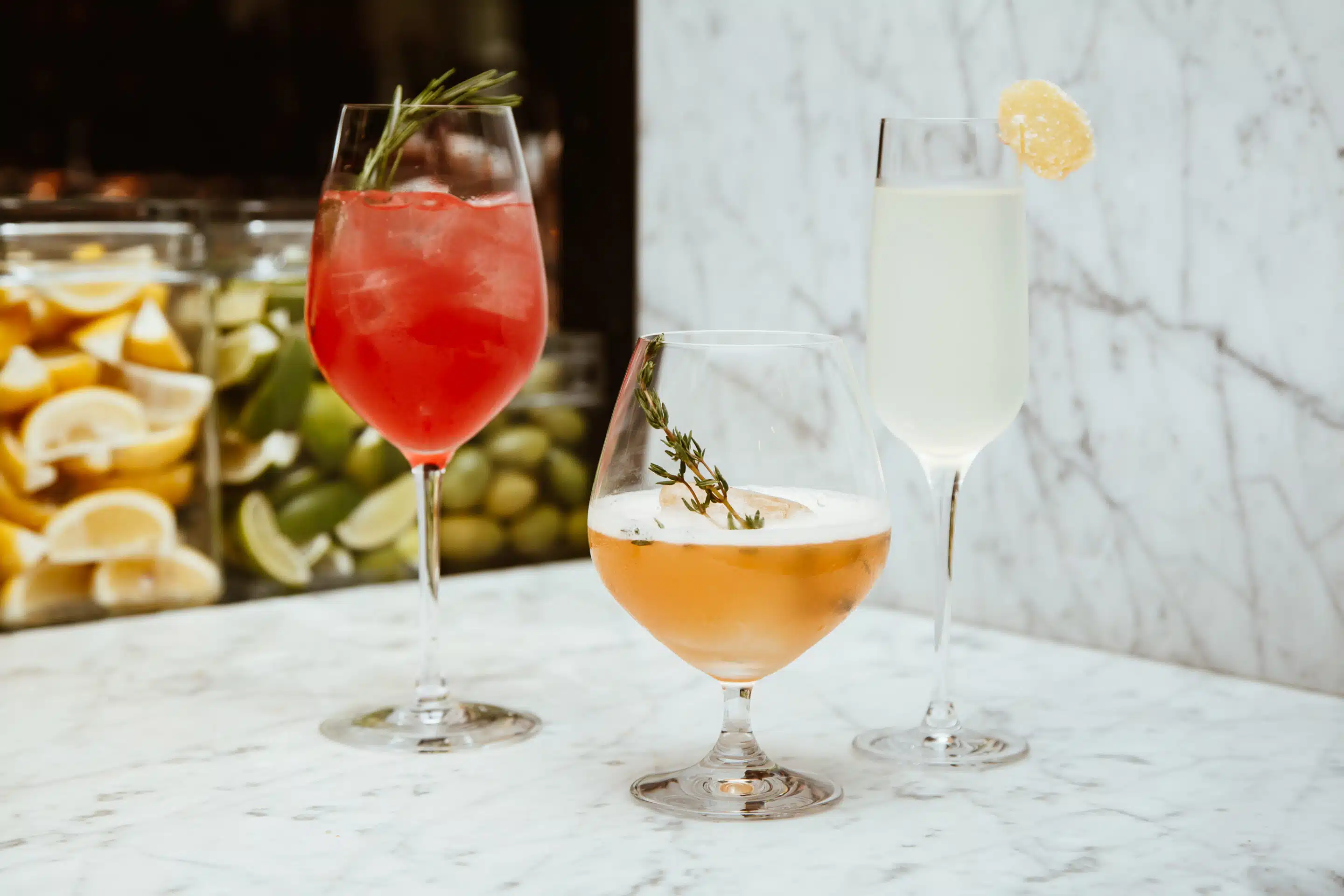
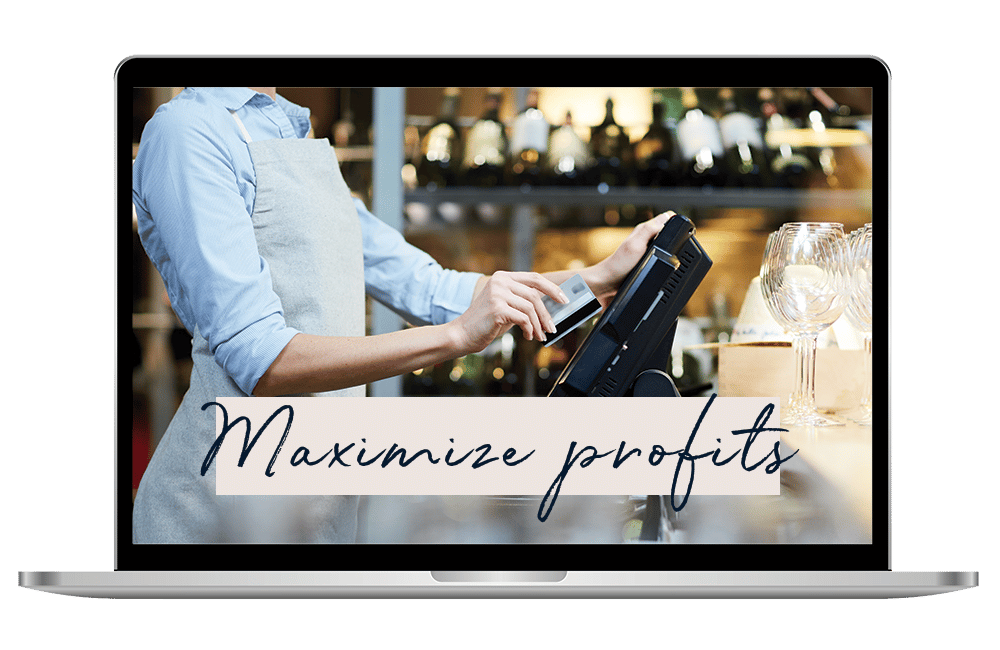
The three costly mistakes you could unknowingly be making?
Find out in this FREE guide and restaurant assessment specifically designed to reveal the unexpected hurdles standing between you and exponential business growth.
Thank You To Our Sponsors
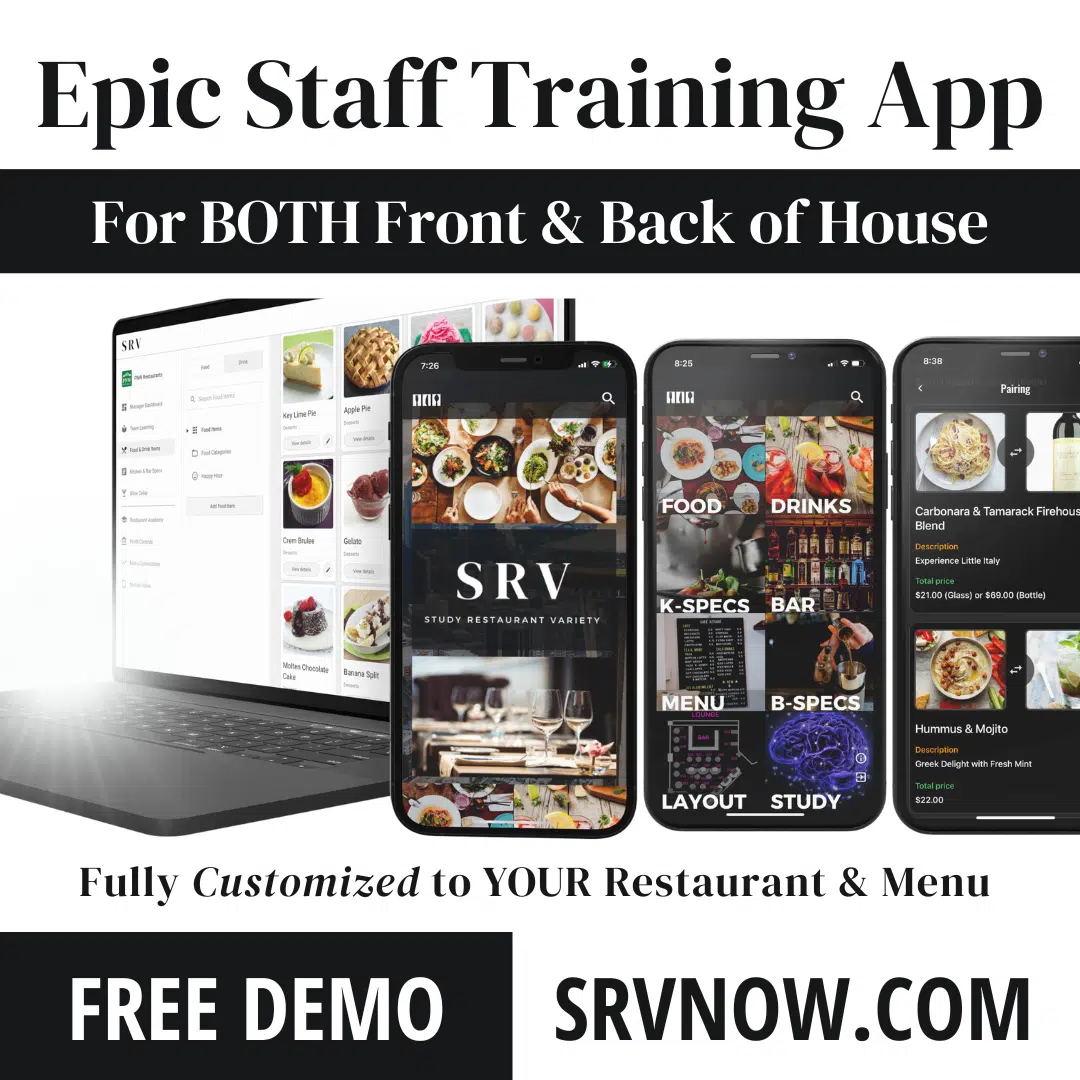

The Employee Retention Tax Credit We will help you determine your eligibility for 2020 & 2021 - Get Started
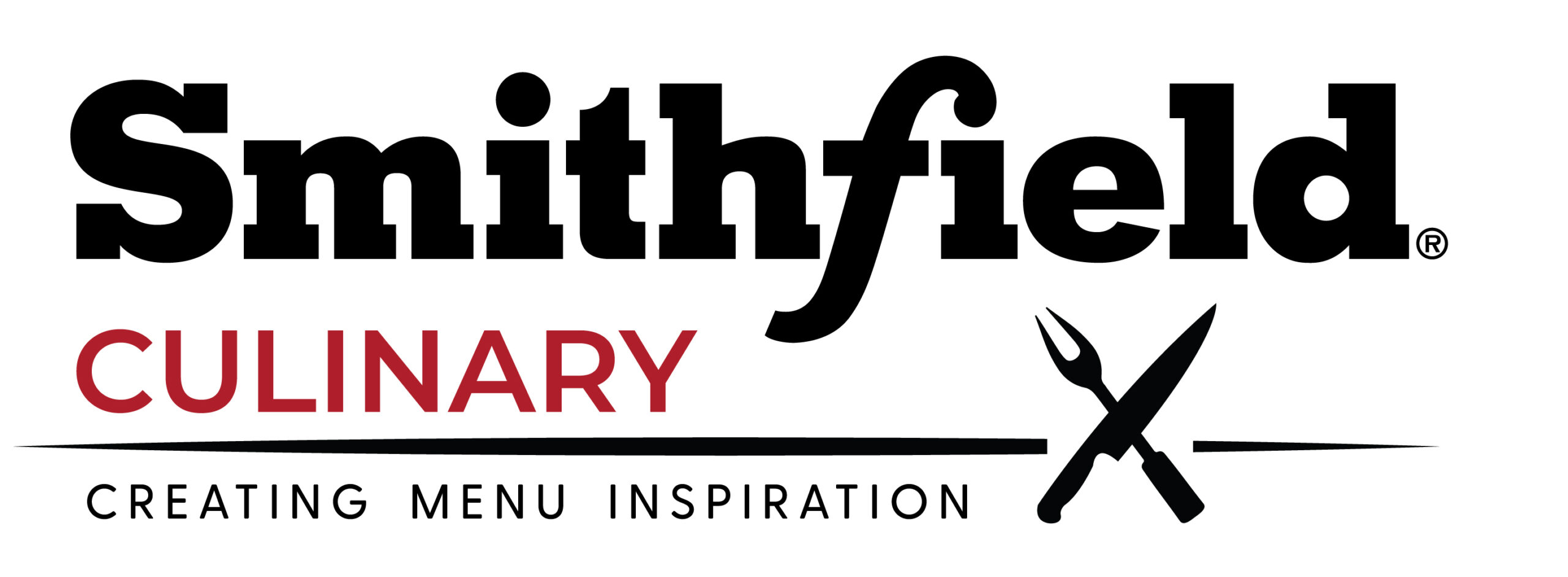
Inspiring Head-Turning Menu Creativity
Culinary Trends & Chef Inspired Recipes - Learn More
Want to become a podcast sponsor?
Please get in touch with Roger at roger@restaurantrockstars.com
